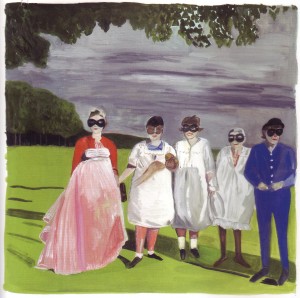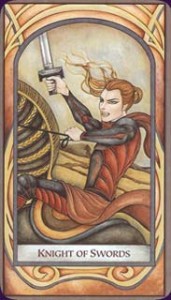Stumbled onto Gold!
 Last night I was “digging” around on Dharmaseed for a series of talks to get into, when I noticed this little nugget of news:
Last night I was “digging” around on Dharmaseed for a series of talks to get into, when I noticed this little nugget of news:
Audio Restoration of Achaan Sucitto’s Anapanasati Series: Alun Hoggett has kindly worked to improve the audio quality of Sucitto’s Anapanasati series. Alun writes:
“I stumbled upon these talks when I was looking for a detailed exploration of the Anapanasati Sutta. Ajahn Sucitto drew me in with his cheerful matter-of-fact, often lighthearted delivery and the light he shed on each of the 16 instructions in the sutta. I was particularly drawn to his words on how we can practice directing our attention, and then feeding this attention skillfully so we can maintain a steady awareness. He encourages tuning in to both the quality of attention and the way we sense the object to which that attention is directed.
“When I first listened to these talks the volume of the recording went from soft and muffled to loud and distorted. But I was so taken by what I was hearing that I decided to put the talks into my audio editing suite to see if I could make them clearer. I evened out the levels, filtered some of the background noise and balanced the frequencies to make the voice stand out. Although it is impossible to remove distortion, the final versions are much easier to follow and, from my perspective, will continue to bring insight after listening to them numerous times.”
***
So I clicked on the series of talks. I’ve only listened to the first one, but I can already tell — I’ve stumbled onto GOLD. The audio quality isn’t perfect, but it’s not bad. There are 8 talks in all, each between 40 and 60 minutes. They were given at Cittiviveka monastery (in England) during an 8-day retreat in October of 1998.
Click here for the series. Try listening to one talk each day, and then sitting for a bit, if possible. (I listen to the talks at night and then sit the next morning). It’s kind of like being on retreat!
Priceless.
Mirabai: On Being
 My very first Dharma teacher (and my very, VERY dear friend and mentor), Mirabai Bush, was featured on Krista Tippett’s radio program: On Being, a week ago Sunday (7/19).
My very first Dharma teacher (and my very, VERY dear friend and mentor), Mirabai Bush, was featured on Krista Tippett’s radio program: On Being, a week ago Sunday (7/19).
I hesitate to say anything about Mirabai because whenever I do, I always end up saying something that sounds so way over the top..and yet, it doesn’t even begin to come close to what an extraordinary human being she is…and what an amazing effect she has had on my life. Let me just say that I love her. And I am loved by her. But in a very unusual, non-personal kind of way. (I told you…it’s hard to explain.)
Anyway. When you get a chance, listen to her interview here.
5 Ways
 I listened to another excellent talk last night, this one by Akincano Marc Weber, in which he outlined five ways the Buddha offered to deal with distracting or obsessive thoughts….the ones that come either while we’re meditating or while we’re just trying to live a good and peaceful life! (Listen to the talk here)
I listened to another excellent talk last night, this one by Akincano Marc Weber, in which he outlined five ways the Buddha offered to deal with distracting or obsessive thoughts….the ones that come either while we’re meditating or while we’re just trying to live a good and peaceful life! (Listen to the talk here)
5 Ways to Deal with Obsessive Thoughts:
#1. If it’s possible, just ignore them.
#2. “Fight fire with fire”…by replacing intrusive thoughts with more useful/helpful/wholesome thoughts.
#3. Remind yourself that you’ve “been to this movie…and know how it ends.”
4. Undermine the power of the thought (or emotion) by making fun of it or exaggerating it or giving it some kind of ridiculous persona.
#5. As a last resort, apply “brute force.” (Sometimes you just have to tell your mind to SHUT THE F@%K UP!)
Not Who You Are
 Last night I listened to a great talk by Phillip Moffitt, in which he pointed out the difference between being identified with an emotion (or thought, feeling, or mind state) and being characterized by it. It’s one thing to feel sad, for example, and quite another to feel that you ARE sad.
Last night I listened to a great talk by Phillip Moffitt, in which he pointed out the difference between being identified with an emotion (or thought, feeling, or mind state) and being characterized by it. It’s one thing to feel sad, for example, and quite another to feel that you ARE sad.
It’s not just a trick of semantics. It’s the difference between being able to experience sadness (or rage, anxiety, confusion, etc.) and being overwhelmed by it.
Phillip explains this much better than I can. Listen to him here.
Lover. Warrior. Ruler. Sage.
I listend to a terrific talk the other night on the Four Energy Patterns (iddhipada in Pali) that are the basis for any successful endeavor. The talk was given by Ayya Santacitta and she used her own life story to illustrate these four different kinds of energies that are all necessary, each at different times, in order to realize a wise heart’s true desire. (You can listen to the talk here.)
Here, I’m expanding a bit on what she said (and drawing from another great talk by Marc Akincano Weber on this same topic, which you can listen to here). I’m identifying each of these energies as an archetypical character.
This is the energy that gets things going. (chanda in Pali) It’s a deep intention, desire, or aspiration that reaches out to one’s highest potential.
This is the energy that makes things happen. (viriya in Pali) It’s the courageous effort, the strong determination, and the relentless persistence that will surely be needed.
This is the energy that keeps things going. (citta in Pali) It’s the managerial mind state, the practical taking-care-of-business intelligence, and the ability to sustain one’s initial effort over the long haul.
 And finally, there’s the Sage.
And finally, there’s the Sage.
This is the energy that makes wise adjustments to changing conditions, (vimamsa in Pali) the judgement to know whether to tweak the original plan and keep going or to take a deep breath and set out on a new course.
Think about it!
Every Moment
 I just listened to a sweet little 2-minute dharma talk given by Sylvia Boorstein at the month-long retreat going on right now at Spirit Rock. (click here)
I just listened to a sweet little 2-minute dharma talk given by Sylvia Boorstein at the month-long retreat going on right now at Spirit Rock. (click here)
It’s definitely worth taking the time to listen, but if you haven’t got the 2 minutes, here’s the key teaching:
“Every moment of mindfulness erases a moment of conditioning.”
Pay Attention, Don’t Cling, Be Kind
 The Buddha famously said, “I teach one thing and one thing only: Suffering and the end of suffering.” Which sounds like 2 things, but still.
The Buddha famously said, “I teach one thing and one thing only: Suffering and the end of suffering.” Which sounds like 2 things, but still.
In a recent talk given at the month-long retreat currently being held at Spirit Rock (where participants listen to a dharma talk every single night), Sally Armstrong opened the evening’s session — somewhat apologetically — by saying that really, every dharma talk any of the teachers ever give are all really just variations on the same 3 instructions:
(1) Pay Attention
(2) Don’t Cling
(3) Be Kind
Having listened to thousands of dharma talks over many years….I’d have to agree. But oh how hard it is, just to do those 3 simple things!
Which is why it’s good to keep listening to the talks.
So here are some excellent ones to get you started, all given during this month’s retreat at Spirit Rock:
Finding True Happiness, by Greg Scharf
Extraordinary Seeing: Simplicity, Honesty and Mindfulness, by Carol Wilson
Mindfulness Includes Everything: Including Star Showers, by Sally Armstrong
Easy as 1-2-3!
What If?
 Last night I listened to an excellent talk by Gloria Taraniya, given at the Forest Refuge this past week, in which she offers reflections on not getting caught up in how we SHOULD be, but instead, turning to how we actually ARE.
Last night I listened to an excellent talk by Gloria Taraniya, given at the Forest Refuge this past week, in which she offers reflections on not getting caught up in how we SHOULD be, but instead, turning to how we actually ARE.
She said that as she was struggling with this process, these four questions spontaneous arose in her mind:
1. What if there isn’t any right way to be?
2. What if the way you are is just fine?
3. What if all the self-improvement just compounds the suffering?
4. What if the only problem here is that you think there’s a problem here?
Yeah!
***
(illustration from “My Favorite Things,” by Maira Kalman; click on image to enlarge)
Let It Be A Mystery
 I listened to an excellent talk the other night by Winnie Nazarko given during the 3-month retreat that’s finishing up right now at IMS. The talk is called Second Guessing the Universe, and in it she discusses the problem of delusion — basically, that we don’t know when we’re deluded because, well, that’s the nature of delusion: we think we know, but we don’t.
I listened to an excellent talk the other night by Winnie Nazarko given during the 3-month retreat that’s finishing up right now at IMS. The talk is called Second Guessing the Universe, and in it she discusses the problem of delusion — basically, that we don’t know when we’re deluded because, well, that’s the nature of delusion: we think we know, but we don’t.
As this relates to our “progress” in the practice, this means that we can’t know “how far along” we are on the path — what kinds of insights/experiences we should be having — because it’s impossible to know the twists and turns of the path until we’ve actually walked it through to the end.
We can know that we are on the path. And we can look back and see, over the long run, that we are experiencing (and causing) much less suffering than in the past. But as to how “close” we are to the “end” (to some kind of “breakthrough” or “enlightenment”)….we can’t know that because at this point we don’t — we can’t — really understand the unfolding of the path.
We can know the direction we’re heading — toward less suffering. But we can’t really know exactly where we “are” in terms of “progress,” because the fruit of the path is not something that can be described in words or concepts. It can be pointed to, but ultimately it’s beyond explanation…it’s something that has to be experienced.
Like the taste of a mango. You can hear/read/think about it all you want, but until you actually take a bite — you can’t know the taste.
So: Let the path be a mystery. Keep practicing. Keep noticing whether or not — over the long run — there is less suffering in our lives. Stay attentive. Respond, as necessary. Relax. And let the path unfold in its own way.
***
image: Scherzo di Follia (Game of Madness), by Pierre-Louis Pierson
Meditation as Relationship
 I really like what Akincano Marc Weber says about meditation — that it is about establishing a relationship with your mind.
I really like what Akincano Marc Weber says about meditation — that it is about establishing a relationship with your mind.
“…It is meeting your mind, engaging your mind, inquiring into the dimensions of your mind, finding out what your mind needs….
“It’s what you do in relationship. You don’t just go in, shake hands, and let rip with your project or with your plan. You establish a relationship. You say Hello, How are you, Where have you come from, Have you slept well, Where are you staying…. You establish a relationship…..
“Your mind has a life of its own. I think you will agree with me on this after some meditation. What is happening in your mind will need your skillful response, your attuned response. You can’t just go in there and give orders.
“You can’t just go in there and follow along, either. We’re not doting on all our whims and fancies. But as meditators, we do want to know what the mind has as this life of its own. We do want to know its images. We do want to know its desires. We do want to know what makes it calm, what makes it anxious, what makes it scattered, or collected. You do want to know all these things. And to find this out requires a skill. And that skill is a relational one.
“It has something to do with curiosity. And it has something to do with kindness. It has something to do with patience. And a tolerance for your mind to be different from what you expect it to be, from what you think it should be. A tolerance for what is baffling, surprising, bewildering to you…..
“You will need the skill to meet what is presently arisen. Take what you find from where it is and turn it into a wholesome direction, cultivate from there, refine from there. Some things will need to be strengthened. Some things will need to overcome. That is a relational skill.”
(For a link to the entire talk, click here.)



